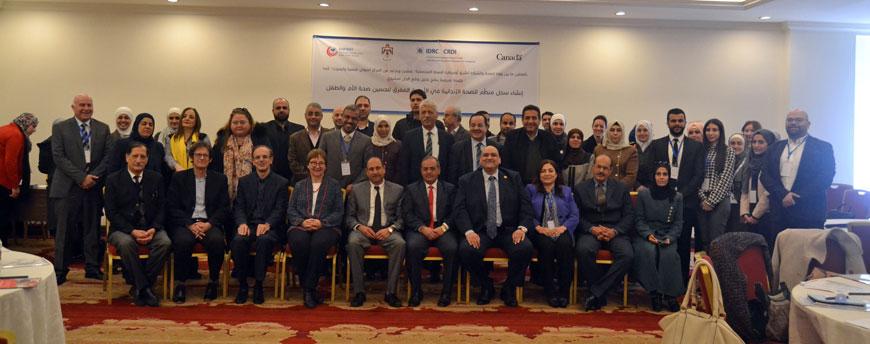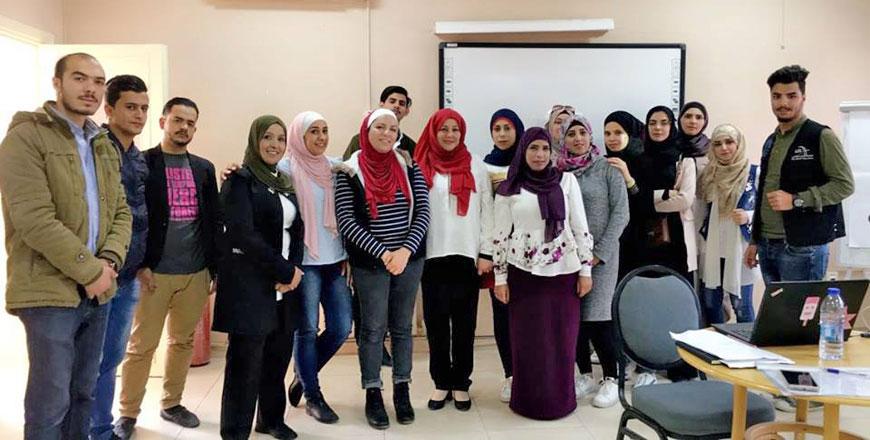You are here
Sexual, reproductive health services in Jordan still ‘insufficient’ — experts
By Ana V. Ibáñez Prieto - Dec 11,2018 - Last updated at Dec 11,2018

Stakeholders in health sector pose for group photo at the workshop on sexual and reproductive health awareness (Picture by Ana V. Ibáñez Prieto)
AMMAN — While sexual and reproductive health (SRH) awareness is highly needed, SRH information systems in the Kingdom continue to be inadequate, health researchers warned on Monday.
According to the experts, women benefitting from these services still see the current SRH information system in the country as “inefficient and inaccurate”.
The remarks came during a debriefing session held on Monday to analyse the context of a project implemented by the Eastern Mediterranean Public Health Network (EMPHNET) in Mafraq Governorate, where the organisation seeks to improve harmonised Reproductive Health Registry through the establishment of a health information system.
Funded by the Canadian International Development Research Centre (IDRC), in cooperation with the Ministry of Health, the first phase of the project explored the current registration methods used for SRH services, the types of care provided and feedback loops.
During the session, researchers warned that the lack of reliable data limits the ability of health providers, planners and community leaders to make informed decisions that can influence the well-being of women and children, particularly in vulnerable and undercounted populations.
The experts also warned that information gaps lead to limited availability of maternal and child health data “at the time when they are needed the most”. Inability to compare or correlate data on the records, poor data quality and an “enormous” waste of resources.
Building on the current scenario, the researchers stressed the need to “build human capacity, enhance health communication and infrastructure, improve network access, coordinate intersectoral endeavours and establish a national SRH steering committee”.
“This project addresses the fragmentation, duplication and gaps in the data leading to operational inefficiencies,” IDRC Regional Director Barbara Shanston said during the session, stressing that the initiative is “focused on health equity and gender equality, reflecting Canada’s overall focus on development efforts that include everyone”.
“Given the high number of Syrian refugees in Mafraq, a registry will be designed to serve both refugee and non-refugee populations, and to address the different health needs and social contexts of the various groups," EMPHNET said in a statement made available to The Jordan Times.
“The establishment of the registry will result in improved quality and timeliness of reproductive health data, better integration and interoperability among different health facilities, a strengthened referral system, increased capacities by decision-makers and providers to use health data and plans to scale up the efforts to other parts of the country,” the statement added.
“Such tools encourage flexible, affordable solutions that can be shared with policymakers to provide them with the data to identify areas of improvement and enhance the quality of life of all individuals,” EMPHNET Executive Director Mohanad Ensour said at the session, stressing that “establishing a registry in Mafraq is key to enhancing maternal and child health in an area characterised by diverse communities and diverse health service providers”.
Ayoub Sayaydeh, assistant secretary general of primary healthcare at the Ministry of Health, said that “this registry will provide the main indicators that the evaluation of our health system will depend on in the areas of reproductive health”.
Related Articles
AMMAN — The Jordanian Hashemite Fund for Human Development (JOHUD) has partnered with Harvard’s T.H.
AMMAN — Canada’s International Development Research Centre (IDRC) has officially inaugurated its Middle East and North Africa regional offic
AMMAN — The Cabinet on Sunday, in a session chaired by Prime Minister Jafar Hassan, approved the National Policy and Strategy for Quality and Patient Safety for 2025 to 2030.


















